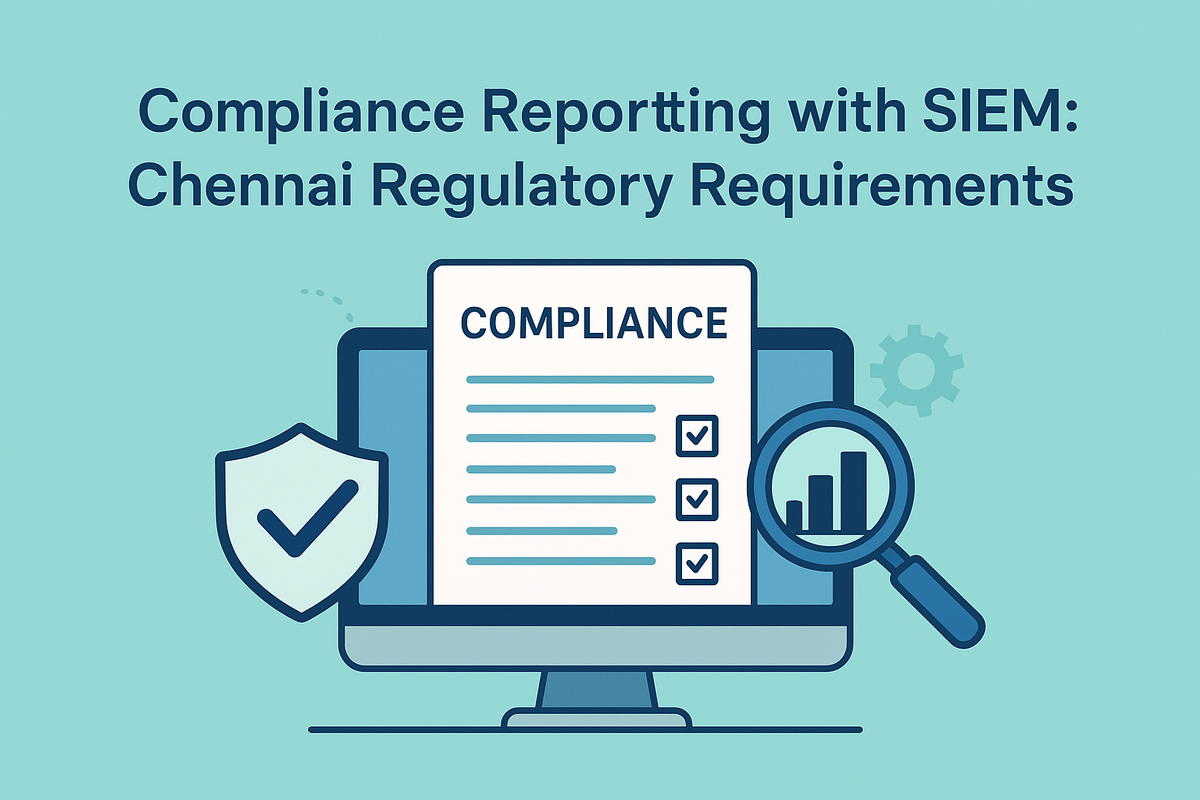Compliance Reporting with SIEM: Chennai Regulatory Requirements

Introduction: Why Compliance Reporting Matters
Compliance reporting is an essential element of any enterprise’s cybersecurity strategy in Chennai, a city at the forefront of India’s IT and business innovation. With growing regulatory scrutiny and frequent cyber threats, organizations must use Security Information and Event Management (SIEM) solutions to automate compliance tasks, document security events, and streamline audits.
Chennai’s Evolving Cybersecurity Risks
Chennai’s enterprises face a dynamic threat landscape marked by phishing, malware, and data breaches, driven by digital transformation and cloud adoption. SMEs and major corporations alike are increasingly vulnerable as attackers exploit gaps in compliance and reporting. Modern security strategies must go beyond technical controls, integrating regulatory requirements into routine operations.
Key Regulatory Requirements Impacting Compliance
National and State Laws
- IT Act 2000 & Amendments: The backbone of cybersecurity regulation, establishing requirements for digital data protection, log retention, and breach reporting across India—including Chennai businesses.
- CERT-In Directions (2022, updated 2025): Mandate rapid (within 6 hours) incident reporting, minimum 180-day log retention, synchronized system clocks (NTP), and strong evidence handling. New 2025 guidelines introduce stricter audit ethics and annual security testing for critical sectors.
- DPDP Act (2023): The Digital Personal Data Protection Act shapes breach notification requirements and personal data handling, often triggered in security incidents.
- Sectoral Regulations: RBI mandates for banks and NBFCs covering incident alerts, periodic audits, and threat sharing; SEBI and IRDAI frameworks for financial and insurance sectors, with sector-specific SIEM metrics and reporting obligations.
Local Chennai Requirements
Chennai enterprises must also follow business laws like the Companies Act, 2013, which governs statutory register maintenance, annual filings, and director reports. SMEs must abide by GST, tax, and labor regulations as well as sector-specific rules on cyber audits and incident disclosures.
How SIEM Supports Regulatory Compliance Reporting
SIEM solutions are tailored to automate collection, correlation, retention, and reporting of security data across diverse IT environments. Key SIEM functionalities relevant for Chennai’s compliance landscape include:
- Centralized Log Retention: Meets the 180-day rule, ensuring all logs are stored, indexed, and retrievable for audits or investigations.
- Incident Detection & Response: SIEM flags reportable events, helps automate timelines (e.g., triggering exports for breach response), and tags incidents according to requirements (e.g., CERT-In definitions).
- Automated Compliance Reports: SIEMs can generate export-ready documentation for standards such as IT Act, DPDP, RBI/SEBI/IRDAI mandates, PCI DSS, HIPAA, and ISO 27001.
- Audit Trail Creation: Maintaining immutable records of security actions, administrator access, and control changes to demonstrate compliance in audits.
Building an Effective Compliance Reporting Program
Governance and Scoping
- Map relevant data types, processes, vendors, and systems that intersect with compliance obligations.
- Appoint a compliance coordinator and define incident response SOPs (standard operating procedures) referencing local and national laws.
Controls and Technology
- Prioritize onboarding key log sources to SIEM, configuring write-once-read-many (WORM) features for critical logs.
- Implement multi-factor authentication (MFA), privileged access management (PAM), and asset inventory aligned to SBOM mandates.
- Enforce robust NTP configurations and develop drift alerting mechanisms per CERT-In.
Training and Awareness
- Conduct regular security drills and table-top exercises, especially for reporting deadlines and data breach scenarios.
- Educate staff on handling personal and sensitive data under DPDP and sectoral privacy frameworks.
Continuous Assurance
- Internal audits of SIEM performance, logging flows, compliance workflows, and vendor agreements.
- Periodic reporting and attestation (quarterly or annual), with proactive updates in line with evolving Chennai and national regulations.
Reporting Best Practices
- Align SIEM alerts and dashboards with terminology specified in local regulations (e.g., “reportable incident” tagging).
- Maintain documentation templates for recurring compliance filings, segregating technical, financial, and privacy-related disclosures.
- Collaborate with legal and IT teams to ensure reporting aligns with cross-framework needs (e.g., DPDP Act privacy versus sectoral security mandates).
Future Trends and Challenges
- Emerging requirements for SBOM (Software Bill of Materials), third-party risk reporting, and stricter accountability for data handling post-audit.
- Ongoing harmonization of privacy and security regulatory regimes, requiring SIEM workflows that can flexibly support multiple standards.
Conclusion: Steps Forward for Chennai Enterprises
Chennai organizations must embed compliance not as a one-time event but a continuous process. SIEM platforms are an indispensable part of an effective compliance strategy, providing real-time support to meet local and national requirements, streamline audits, safeguard data, and foster stakeholder trust. By investing in expert guidance, adopting best-in-class SIEM solutions, and staying up to date with Chennai’s evolving laws, enterprises can turn regulatory demands into business-strengthening opportunities.
Take the Next Step with CodeSecure Solutions
Cyber threats are growing more sophisticated every day. With a trusted partner by your side, you can safeguard your business while focusing on what truly matters—growth and innovation.
At CodeSecure Solutions, we deliver comprehensive cybersecurity services in Chennai, uniquely tailored for startups, SMEs, and enterprises:
- Vulnerability Assessment & Penetration Testing (VAPT)
- Network Security Solutions
- Compliance Support (ISO 27001, PCI-DSS, HIPAA, DPDP Act, GDPR)
- Cloud & Endpoint Protection
- Security Awareness Training
No matter your industry or size, CodeSecure customizes solutions to fit your needs—ensuring your data, reputation, and operations remain secure.
Ready to Strengthen Your Defenses?
- 📞 Call: +91 73584 63582
- ✉️ Email: [email protected]
- 🌐 Visit: www.codesecure.in
Stay secure. Stay informed. Choose CodeSecure Solutions—your partner in cyber resilience.
